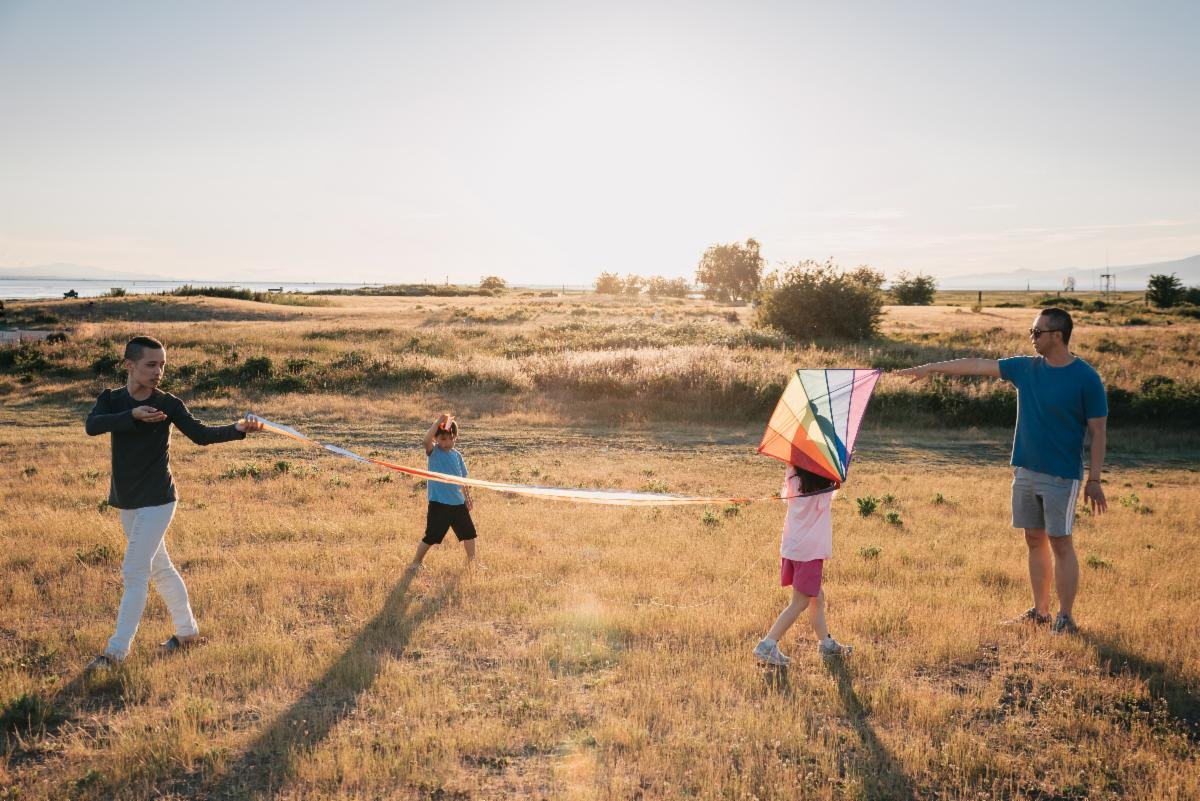What Queer Families Know That You Should Know, Too
the heart of the matter
A year ago, I asked my chosen niece if she knew any other families with queer parents. “Of course,” she responded, “my best friend has four moms.”
She must've spotted my unwitting eyebrow raise. She smiled. “Their moms split up and remarried. Everyone lives on the same block.” To me, that feels decidedly lesbian. I found myself a bit wistful as I imagined four parents splitting the tasks of carpooling, laundry, and schlepping kids to those awful birthday parties in rooms of inflatable obstacle play structures.
My queer little family has also been privileged with extra hands, hearts, and wallets. From the moment we adopted our first son, we’ve relied on a squadron of aunties and guncles to help us raise our kids.
This extended family has volunteered to spend the night and do the midnight bottle feedings so my husband and I could sleep through the night. They have taken the kids on weekend excursions, run weekly summer science lessons, taught them to kayak and snowboard, bubbled with us for quarantine vacations, and performed in drag as Disney princesses at birthday parties. Most critically, when we fought through mental health struggles, they rallied. We were scared and hurting but never alone.
Every queer family I know relies extensively on community connections. My friends send their kids to stay with their best friends in Mexico City every summer. The kids learn Spanish while being spoiled by chosen relatives, while Daddy and Papa get six weeks of precious child-free time.
One of my chosen nieces went through a mental health struggle a few years ago. Her moms came up with an amazing system to call in their community for support. My job was to show up once a week and take my niece or one of the moms out for a couple of hours. I would arrive and they would tell me what they needed. Once, when my niece trashed her room in a fit of dysregulation, the exhausted moms called friends who came over and cleaned up the mess.
Americans are socialized to consider nuclear families as both the norm and state of achievement. Even for folks of color with strong bonds to extended and multigenerational families, economic success often means moving to a bigger house, physically and emotionally separating from “the clan”. The picket fence dream comes with a huge cost. Four parental hands are too few to make light work. When we inevitably fall short of being great at having a career, being a brilliant parent, maintaining our health and social connections, and remembering to make cute sandwiches for our kid’s school birthday party, we end up blaming ourselves rather than an impossible system. This is especially true for moms.
So why are queer families so creative about breaking the norms of nuclear family isolation? There are a few factors. First, there is our history as nontraditional childraisers. Because people in same sex relationships don’t procreate, we have always found purpose in supporting kids who aren’t our direct offspring. This is often focused on nephews and nieces, but can also be found in godparent relationships, foster parents, and the like. Many queer people didn’t have the opportunity to have their own kids. Many of my friends choose to remain childfree. But they have love, time, and other resources to offer, and delight in playing the role of active aunties and uncles. They get to have profound relationships with my kids, all while incorporating the insights and techniques of their take on positive parenting that enrich these connections.
Discriminatory history also plays a role. Because so many queer folks have faced rejection or estrangement from their families, we have long embraced the concept of chosen families. We create community, including family units, rituals (friendsgiving anyone?), and childrearing practices. We can invent our own ways of showing up for children, or asking for support.
Whatever the reasons, my family delights in the support we get from our community. I tell new parents - whatever their genders or sexualities are - to call in community in ways that support your family. I don’t know how anyone survives without this.
To celebrate Pride with an activist stance, consider donating to these causes: the first three are LGBTQQ organizations run by people of color.
Oasis Legal Services Immigration support especially for LGBTQQ asylees fleeing violence.
LYRIC Supporting queer youth in the Bay and beyond.
Transgender Legal Defense and Education Fund Representing transgender and nonbinary clients in precedent-setting lawsuits all over the country.
Your kid’s middle or high school probably has a Gay Straight Alliance. Call the school secretary and ask how you can donate $20, $50 or $100 to the club. Learn more about GSAs here, and consider attending parenting classes to deepen your understanding and support of LGBTQ+ youth in educational settings.
we’re obsessed with
American Born Chinese. This delightful series on Disney+ somehow pulls off combining a saccharine high school drama with a Chinese mythology epic tale. Come for the fun martial arts fight scenes and performances by Michelle Yeoh, but stay for the honest, loving portrayal of first generation Chinese American parents struggling to save their son, their dreams, and their marriage. This is the rare show that captivated my kindergartner, my tween, and both dads!
The Last Mile. I watch this stunning spoken word performance every year during Pride month. Grab some tissue and feel all the feels. If you don’t listen to the Snap Judgement podcast, it’s time to start.
Homemade sorbet. I’ve declared The Summer of Ice Cream in our household. This means trips to different ice cream shops on Friday afternoons, and putting our homemade ice cream maker to use at least once a week. I’m lactose intolerant, and I prefer desserts with a sour profile, so I’ve been playing around with tangy fruit sorbets. This mango sorbet tastes like summer in Hawaii. We skipped the rum, but I bet it would be delicious with it.
Drunk history. Speaking of alcohol, here’s an irreverent take on the Stonewall Uprising.
Mrs Meek Shall Inherit The Earth. This segment from This American Life, features journalist Miki Meek interviewing her mom about finding joy and freedom for the first time in life, after her children are grown and her husband passes. It’s both delightful and melancholy. That’s two NPR references in this section. I’m a coastal liberal cliché.
where we’ve been
I spent most of May and June at the companies listed above speaking with parents and childraisers on various positive parenting topics such as How to Stay Calm When Your Child Is Not and Parenting With Cultural Wisdom. I'm so grateful for the Diversity, Equity, Inclusion and Belonging Employee Resource Groups for bringing these opportunities to the working parents.
Book a workshop for your school or organization.
Bring The Village Well to your school or organization. We provide powerful, interactive and fun workshops for parents and/or staff. Learn more.
Ed Center, the founder of The Village Well, is a parenting coach and educator certified in the Triple P method. The Village Well is a community of parents in BIPOC families, focused on attaining more joy, calm, and meaning in family life. We coach parents to prioritize their own healing and wellness, deepen connections with their kids, and learn tools to support better behavior. Services include Parenting workshops, Parenting courses, and community events. Our support is culturally-grounded support and honors your unique family. Ready to stop yelling? Schedule a free consultation with one of our team members.
FOLLOW THE VILLAGE WELL ON:











